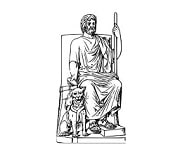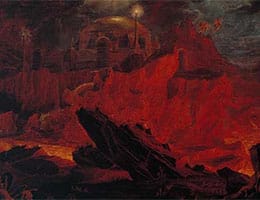 Hades is the name that, in Greek mythology, is given to the god of the underworld and also to the kingdom of this divinity. In Ancient Greece , Hades was believed to occur beneath the planet Earth.
Hades is the name that, in Greek mythology, is given to the god of the underworld and also to the kingdom of this divinity. In Ancient Greece , Hades was believed to occur beneath the planet Earth.
According to myth , Hades was the son of Rhea and Cronus and brother of Poseidon and Zeus . When the three brothers managed to defeat the Titans , they gained control of the cosmos. Hades was left with the government of the underworld, while Poseidon came to control the sea and Zeus, the sky. The solid earth, meanwhile, was at the disposal of the three.
Hades, Poseidon and Zeus, along with their sisters Hera , Hestia and Demeter , were part of the Olympian gods . These gods lived on the summit of Mount Olympus and formed the Greek pantheon .
In the fight against the Titans, Hades had a helmet of invisibility given to him by the Cyclops , just as Poseidon received a trident and Zeus received thunder . The distribution of the cosmos between the brothers was drawn by lot, with Hades keeping the underworld where the dead arrived.
As for Hades as a place, the mortals who reached it could not leave it, except for some heroes who did manage to do so; such was the case of Heracles and Theseus. In fact, Odysseus (or Ulysses) himself, one of the most important legendary heroes in Greek mythology, who appears in the Iliad and stars in the play Odyssey , decides to call the spirits of the dead to avoid the descent into Hades. .
Another name given to Hades, this shadowy, mist-covered realm to which all mortals went after life, was Erebus . It is worth mentioning that as time went by, Greek philosophers began to talk about a judgment that took place after death, in which it was decided whether the person was cursed or rewarded. Some of its sections are Elysium, Tartarus and the Fields of Asphodel.
 Much closer in time , several fictional characters were baptized Hades. A rival - and sometimes ally - of Wonder Woman , the villain of Disney 's "Hercules" and a character from "Knights of the Zodiac" received this name.
Much closer in time , several fictional characters were baptized Hades. A rival - and sometimes ally - of Wonder Woman , the villain of Disney 's "Hercules" and a character from "Knights of the Zodiac" received this name.
In ancient Greek, another name for Hades was Plouton , which can be translated as "the rich one." In the Roman Empire, on the other hand, it became Pluto , a version of the name that we also recognize in our language. The Romans linked this god with two from their own mythology, Dis Pater and Orco , who can also be included in the class of chthonic deities .
In the areas of religion and mythology, especially if we talk about Greek culture, the term chthonic is used to refer to a god or spirit of the underworld , which opposes the celestial ones. It is also common for them to be called telluric .
The god equivalent to Hades in the mythology of the Etruscans, a people whose origin is unknown although it is known that they were in the center of present-day Italy, was called Aita.
If we look at Christian theology , the word hades , which also appears in the New Testament, is related to sheol , belonging to Hebrew, which can be defined as "pit of dirt" or "grave." Precisely, in this context it is associated with the world of the dead. The concept of hell , on the other hand, which Christians also contemplate, is more akin to Tartarus of Greek mythology, which is considered a deeper part of the underworld than Hades itself.
